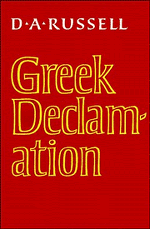4 - Performers and occasions
Published online by Cambridge University Press: 07 October 2011
Summary
Δότε μοι σῶμα καὶ μελετήσομαι.
‘Give me a body and I will declaim!’
Polemon of LaodiceaDeclamations might be taught in school, delivered in public, or written down for distant or future admiration. These functions complemented one another; the teacher won pupils by giving a good performance, the literary man sought from posterity that praise which the tastelessness of his audiences denied in his lifetime. In this chapter, I look at some of the evidence – mostly anecdotal – for these various activities. What did rhetors really do? What were they like?
Even the wealthiest and most ambitious took pupils, though they did not, like their inferiors, have to spend their days entirely in the company of schoolboys. Aristides, by no means a born teacher, sometimes took fees. Lollianus, the great Ephesian sophist who held the chair of rhetoric at Athens and was noted also for his legal expertise, not only taught declamation by example and exercise but gave theoretical instruction – in other words, lectures on the kinds of topics that Hermogenes, Apsines and Minucianus professed. Herodes Atticus, a man of immense wealth and repute, both gave public lectures and provided extra classes for select pupils, a sort of seminar by special admission. But among Philostratus' anecdotes, it is the story of Proclus of Naucratis that gives the most vivid impression of the successful teacher's life.
- Type
- Chapter
- Information
- Greek Declamation , pp. 74 - 86Publisher: Cambridge University PressPrint publication year: 1983

